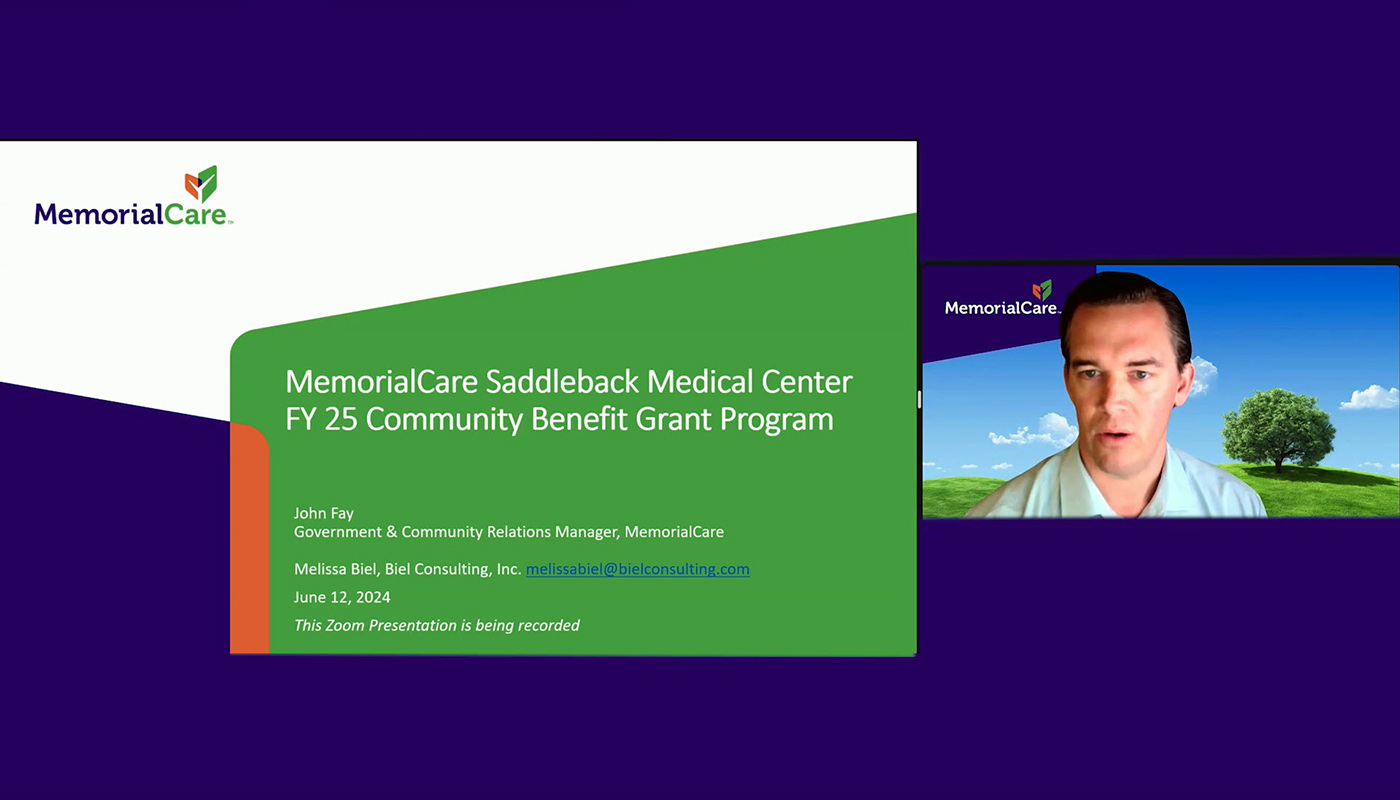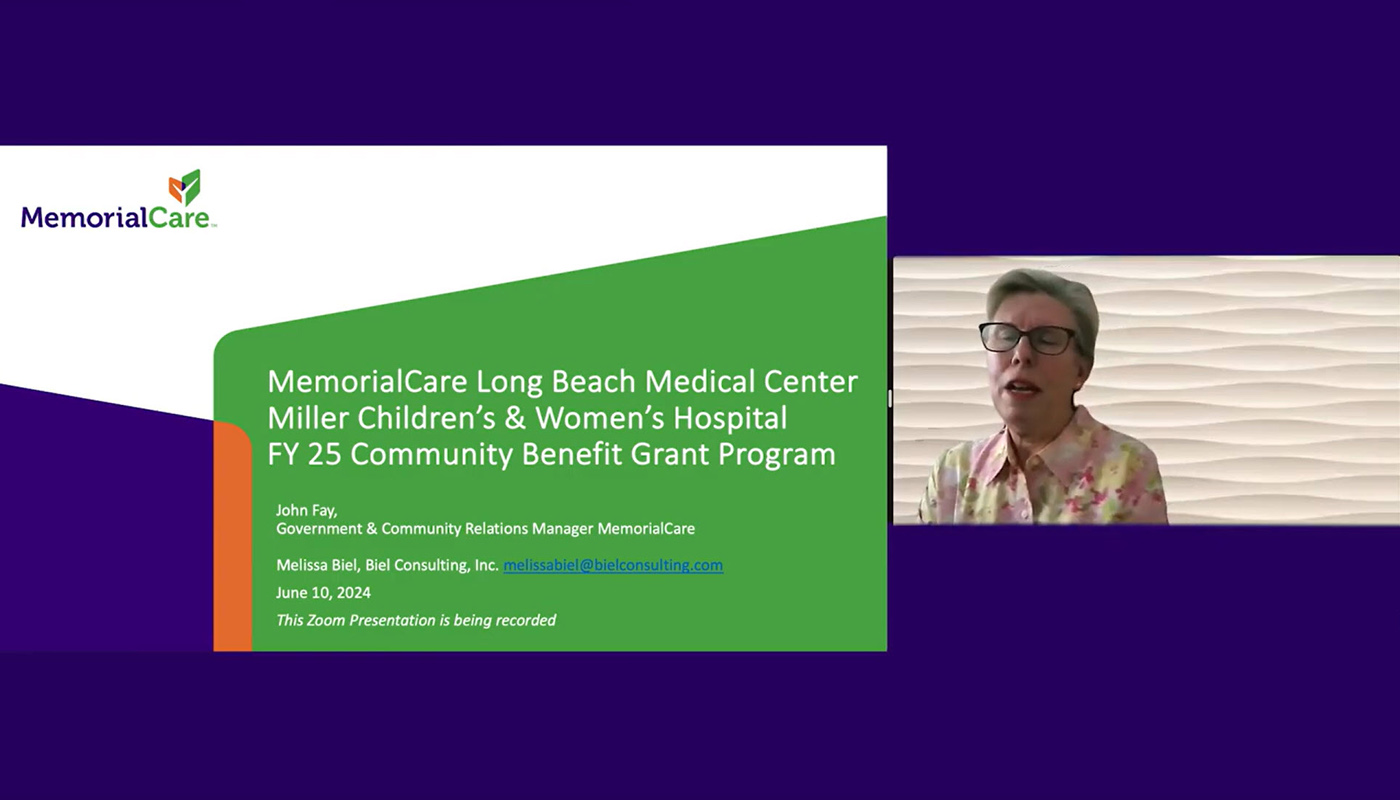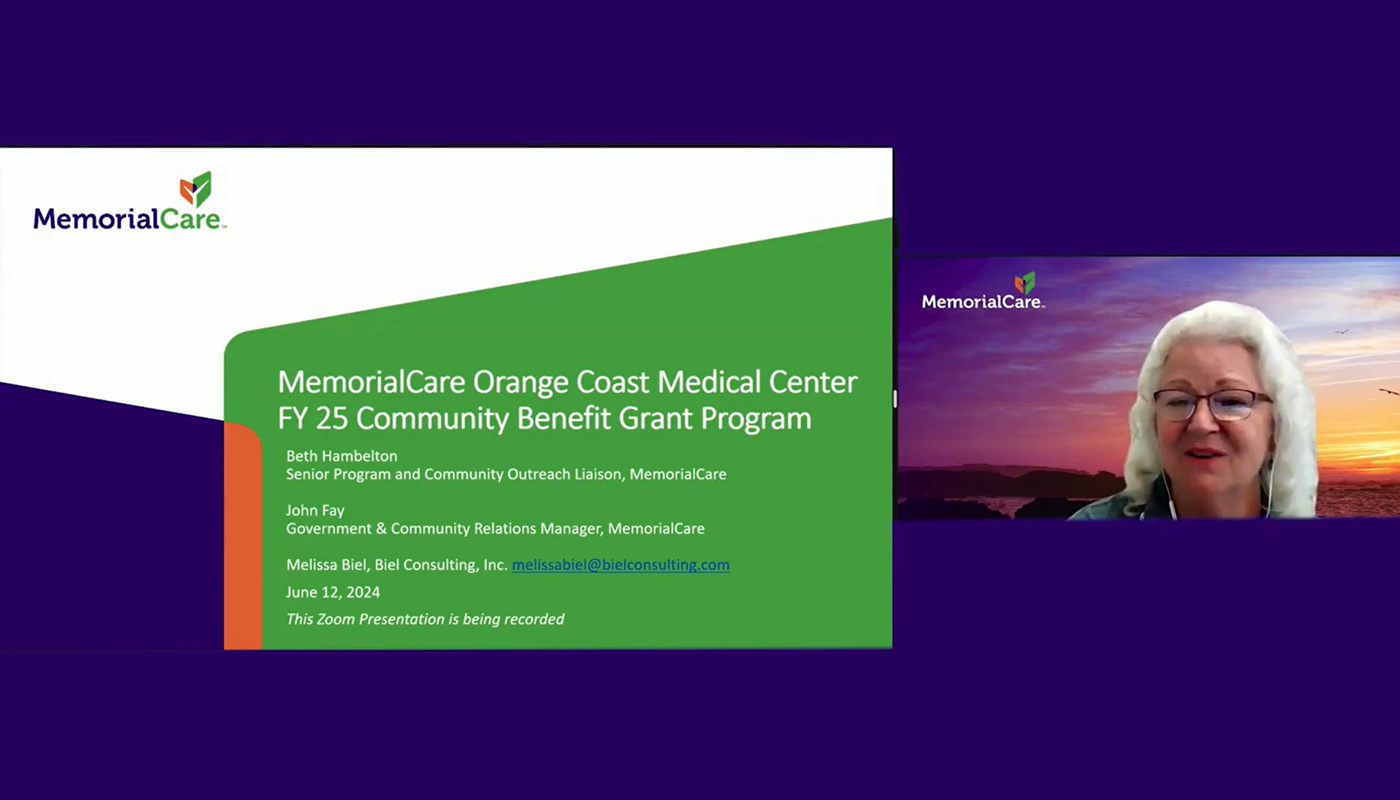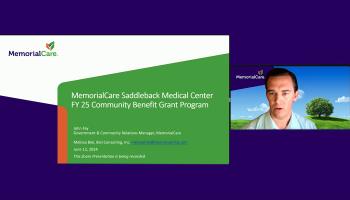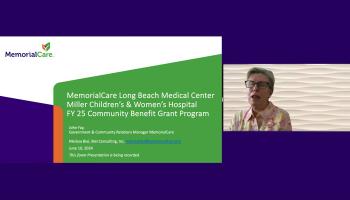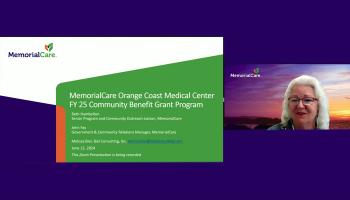MemorialCare FY2025 Community Benefit Grant
MemorialCare welcomes the opportunity to work with organizations to create healthy communities. MemorialCare hospitals have set aside specific funds to support community organizations to improve the health and well-being of the communities served by MemorialCare. Application period is June 10-August 12, 2024.
Learn More About the Grant Process: Watch Hospital Video
Eligibility and Restrictions:
MemorialCare hospitals provide financial support to public health and local nonprofit human service organizations that serve vulnerable communities in our hospitals’ service areas. Organizations eligible for funding through the MemorialCare Community Benefit Grant Program must have a project that aligns with our hospital priority health needs identified in the hospitals’ Implementation Strategies. Eligible organizations must maintain a 501(c)(3) nonprofit tax-exempt status or be a public/governmental agency.
Each MemorialCare hospital will fund 4 project grants in the amount of $12,500 each.
Community Benefit Grant Criteria:
- Applicants must be established community organizations.
- Projects must benefit underserved community residents.
- Projects must be directly related to one or more of the identified health needs prioritized in the respective hospital’s FY23-FY25 Community Benefit Implementation Strategy. Please see Implementation Strategy for each hospital below.
- Funding should demonstrate how you will address the social determinants of health (e.g. food insecurity, and housing and homelessness, etc.) and health equity, in conjunction with a priority health need. Learn more about information on social determinants of health.
- Funding can only be used for project support.
- A project budget is required. If an applicant is using a fiscal sponsor for its 501(c)(3) status, MemorialCare will work with a fiscal sponsor to support the Community Benefit Grant funding.
- Applicants may only apply to one MemorialCare hospital for grant funding per grant period.
Community Benefit Grant Funding is NOT awarded for:
- Operational support not directly tied to the project
- Arts programs or cultural events
- Athletic programs, such as sports teams or leagues
- Fundraising activities
- Annual fund drives
- Building or capital campaign (bricks and mortar) projects
- Individuals
- Religious organizations (for religious purposes or exclusive benefit of their members)
- Political campaigns
- Start-up projects
Measurable Objectives and Outcomes:
Applications must include project objectives with measurable outcomes. Objectives are the specific steps that lead to the successful completion of the project goals. Completion of the objectives result in specific, measurable outcomes that directly contribute to the achievement of the project goals.
An objective is a specific result the project is trying to achieve. Examples of objectives include improved health status, increase in access to health services, access to mental health services, decrease in food insecurity, etc.
An outcome is a detailed, measurable statement that outlines the result of the program for the participant. Examples of measurable outcomes include the number of persons served, the change in persons served compared to a previous period, increase in availability of healthy food, self-reported change in health knowledge or behaviors, etc.
Funding Conditions:
MemorialCare will notify approved applicants via email by Monday, November 4, 2024 and funded organizations are required to submit a signed Letter of Agreement. The initial MemorialCare Community Benefit Grant funding (50% of total, or $6,250) is issued upon receipt of the signed Letter of Agreement and other required information.
The remaining funding is contingent upon receipt of the mid-term grant project report (March 2025) demonstrating successful accomplishment of the project objectives’ measurable results at the halfway point of the grant term.
Submissions: SUBMISSIONS DUE AUGUST 12, 2024
Thank you for your efforts to improve the health of our community, we appreciate the opportunity to partner with you through the Community Benefit Grant Program. All submissions are due Monday, August 12, 2024 5:00PM PDT.
For further information, please contact the following representatives:
- Long Beach Medical Center and/or Miller Children's & Women's Hospital Long Beach: Melissa Biel at [email protected].
- Orange Coast Medical Center: Beth Hambelton at [email protected] or (714) 614-7896.
- Saddleback Medical Center: Roneet Cooper at [email protected] or (949) 741-0032.
Application Instructions:
IMPORTANT: Before you start the online grant application, please complete the following action steps:
1. The Community Benefit Online Grant Application is an electronic online application embedded on this webpage below. IMPORTANT: Responses are unable to be saved while working in this online application.
- It is advised to prepare the responses to the questions in a separate document and copy/paste the responses into this electronic online application.
- Responses include a 2,000 character limit (spaces included).
- A fillable pdf tool of the application questions has been prepared for your convenience. DO NOT submit this document.
2. Please download and complete the Outcomes/Objectives and Budget templates located below. Save them to your computer and upload as supporting documents to the online application questions 7 & 8.
- FY25 Application Template
Now that you have completed the pre-application action steps above, you’re ready to start the online application:
Instructions for Online Grant Application
- When you’re ready to begin the online grant application, click the “Start Application” button below.
- Select which hospital's Community Benefit Grant you are applying for (Long Beach Medical Center, Miller Children's & Women's Hospital Long Beach, Orange Coast Medical Center, or Saddleback Medical Center).
- Select which priority health need(s) the project will address.
- Select which communities the project will focus on (check all that apply).
- Respond to the application questions accordingly. Reminder: Responses include 2,000 character limits (spaces included).
- Please upload your completed FY25 Community Benefit Objectives Outcomes Template as the supporting document to the online application question #7.
- Please upload your completed FY25 Community Benefit Budget Template as the supporting document to the online application question #8.
- Submit Form.
- Organizations submitting an application will receive a confirmation message. If you require a copy of your submitted application, please submit your request to: [email protected]. Thank you.
Community Health Needs Assessment and Implementation Strategy
We welcome feedback on any of MemorialCare's Community Health Needs Assessments and Implementation Strategies. Please send your feedback to [email protected].
Each MemorialCare Medical Center conducted a community health needs assessment (CHNA) in FY22. This CHNA meets the California state law and the federal requirements under the Patient Protection and Affordable Care Act 2010. The CHNA incorporates secondary data from existing sources such CA data sources, cancer registry, benchmark comparison data that measure community data findings with Healthy People 2030 objectives, and the California Health Interview Survey (CHIS), and primary data collection from community members and identified key informants who represent the medically underserved, low-income, minority populations, and populations with chronic disease. Through an examination and review of these data, health needs were identified. The health needs were prioritized through a structured process using defined criteria. This Implementation Strategy addresses the health needs identified through the CHNA.
- 2022 Long Beach Medical Center Community Health Needs Assessment
- 2022 Miller Children’s and Women’s Hospital Community Health Needs Assessment
- 2022 Orange Coast Medical Center Community Health Needs Assessment
- 2022 Saddleback Medical Center Community Health Needs Assessment
Community Health Needs Assessment (CHNA) Implementation Strategy FY2023-FY2025
- FY2023-FY2025 Long Beach Medical Center Community Benefit CHNA Implementation Strategy
- FY2023-FY2025 Miller Children’s and Women’s Hospital Long Beach Community Benefit CHNA Implementation Strategy
- FY2023-FY2025 Orange Coast Medical Center CHNA Implementation Strategy
- FY2023-FY2025 Saddleback Medical Center CHNA Implementation Strategy
Each MemorialCare Medical Center conducted a community health needs assessment (CHNA) in FY19. This CHNA meets the California state law and the federal requirements under the Patient Protection and Affordable Care Act 2010. The CHNA incorporates secondary data from existing sources such CA data sources, cancer registry, benchmark comparison data that measure community data findings with Healthy People 2020 objectives, and the California Health Interview Survey (CHIS), and primary data collection from community members and identified key informants who represent the medically underserved, low-income, minority populations, and populations with chronic disease. Through an examination and review of these data, health needs were identified. The health needs were prioritized through a structured process using defined criteria. This Implementation Strategy addresses the health needs identified through the CHNA.
- 2019 Community Health Needs Assessment Long Beach Medical Center
- 2019 Community Health Needs Assessment Miller Children's and Women's Hospital Long Beach
- 2019 Community Health Needs Assessment Orange Coast Medical Center
- 2019 Community Health Needs Assessment Saddleback Medical Center
CHNA Implementation Strategy FY19
Each MemorialCare Medical Center conducted a community health needs assessment (CHNA) in FY16. This CHNA meets the California state law and the federal requirements under the Patient Protection and Affordable Care Act 2010. The CHNA incorporates secondary data from existing sources such as the 2010 Census, cancer registry and the California Health Interview Survey (CHIS), and primary data collection from community members and identified key informants who represent the medically underserved, low-income, minority populations, and populations with chronic disease. Through an examination and review of these data, health needs were identified. The health needs were prioritized through a structured process using defined criteria. This Implementation Strategy addresses the health needs identified through the CHNA.
- Long Beach Memorial Community Health Needs Assessment 2016 Part 1
- Long Beach Memorial Community Health Needs Assessment 2016 Part 2
- Community Hospital Long Beach Community Health Needs Assessment 2016 Part 1
- Community Hospital Long Beach Community Health Needs Assessment 2016 Part 2
- Miller Children's and Women's Hospital Long Beach Community Health Needs Assessment 2016 Part 1
- Miller Children's and Women's Hospital Long Beach Community Health Needs Assessment 2016 Part 2
- Orange Coast Memorial Community Health Needs Assessment 2016
- Saddleback Memorial Community Health Needs Assessment 2016
CHNA Implementation Strategy FY16
Each MemorialCare Medical Center conducted a community health needs assessment (CHNA) in FY13. This CHNA meets the California state law and the federal requirements under the Patient Protection and Affordable Care Act 2010. The CHNA incorporates secondary data from existing sources such as the 2010 Census, cancer registry and the California Health Interview Survey (CHIS), and primary data collection from community members and identified key informants who represent the medically underserved, low-income, minority populations, and populations with chronic disease. Through an examination and review of these data, health needs were identified. The health needs were prioritized through a structured process using defined criteria. This Implementation Strategy addresses the health needs identified through the CHNA.
- Long Beach Memorial Community Health Needs Assessment 2013
- Community Hospital Long Beach Community Health Needs Assessment 2013
- Miller Children's Hospital Long Beach Community Health Needs Assessment 2013
- Orange Coast Memorial Community Health Needs Assessment 2013
- Saddleback Memorial Community Health Needs Assessment 2013
CHNA Implementation Strategy FY13
Annual Report and Plan for Community Benefit FY23
- Long Beach Medical Center FY23 Annual Report and Plan for Community Benefit
- Miller Children's Women's Hospital LB FY23 Annual Report and Plan for Community Benefit
- Orange Coast Medical Center FY23 Annual Report and Plan for Community Benefit
- Saddleback Medical Center FY23 Annual Report and Plan for Community Benefit
